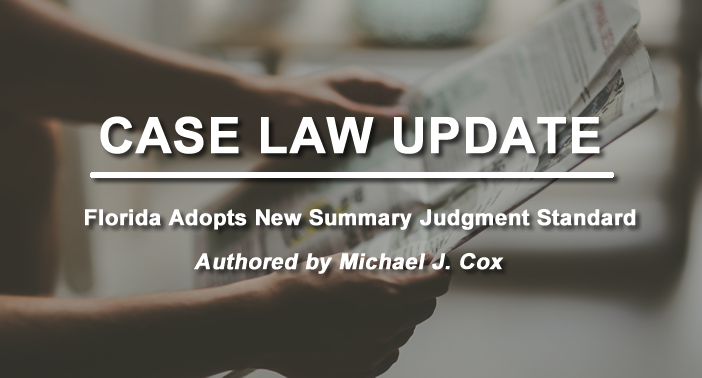Informed counsel, and sophisticated clients, know that rules of procedure—although not the most exciting aspect of civil litigation—can be incredibly important. Genuine understanding and command of the Florida Rules of Civil Procedure set apart merely adequate representation from exceptional counsel. Although the rules themselves rarely change significantly, a potentially major change has been brewing all year. Largely unknown to the general public, the Florida Supreme Court indicated its intention to wholly adopt the federal summary judgment rule, FRCP 56, set forth by the U.S. Supreme Court in Celotex Corp. v. Catrett, 477 U.S. 317 (1986). Although textually similar to its federal counterpart, Rule 1.510, Florida Rules of Civil Procedure, has been more broadly interpreted by state courts and, overtime, a chasm grew between the two summary judgment standards. Until now, the Florida summary judgment standard put a heavy, and some would have said near-insurmountable, burden on the movant, arguably requiring a defendant to disprove a claim, even a dubious one. Not surprisingly, the effect was that trial courts regularly denied motions for summary judgment, deferred on rulings, or otherwise faced reversal at the appellate level for granting summary judgment. Often, the practical result created cases that lingered for years, condoned lazy discovery, increased litigation costs, and allowed even the most unsupported claims to lament or otherwise to proceed and waste precious and limited resources (i.e., the time and expense of jury trials and, particularly, jurors themselves).
The Florida Supreme Court recognized the chasm, contrary to the original intent of the rule, and expressly sought to rectify the issue. The Court’s timing could hardly be better. Without the ability to conduct jury trials for almost a year, and many still awaiting trial, rectifying Florida’s summary judgment standard comes in the middle of an unprecedented backlog. In some cases, the life of cases has doubled and, naturally, so has the cost of litigation. Perhaps more importantly, the Court’s efforts stand to benefit all sides of litigation, potentially streamlining some cases and placing a priority on genuine disputes. While overly simplistic, the amended Fla. R. Civ. P. 1.150 emphasizes the trial court’s responsibility to rule on matters of law and, in the case of jury trials, leave genuine factual disputes to the jury. Conversely, where there is no genuine dispute as to a material fact, the amended rule compels the trial court to dispose of meritless cases. Importantly, the amendment should not be any detriment to genuine disputes, cases with true merit; in fact, this change is likely to help press such matters toward resolution, either to trial or to settlement. Instead, the amended rule potentially empowers trial courts, circuit and county judges, to resolve dubious actions, afford immediate remedy to differing legal interpretations, and tailor civil matters to triable issues; and, in turn, re-emphasizing counsels’ responsibilities to be active in their pre-suit case selection, case management, investigation, and discovery.
In sum, it seems likely that the Florida’s new summary judgment standard could have a significant effect on pending and future cases. Here are just five key points to know about the change:
- Summary Judgment is no longer discretionary. The most subtle change is also perhaps the most significant. Where there is no genuine issue of material fact and entitlement exists as a matter of law, the trial court “shall grant summary judgment,” emphasizing the trial court’s role in tailoring triable issues, being the gatekeeper for dubious cases, and even perhaps compelling the courts to make pronouncements on arguable legal issues before trial. See Fla. R. Civ. P. 1.510(a);
- The trial court cannot merely deny or grant summary judgment. It is now required to “state on the record the reasons” for granting or denying. Perhaps arguably so, where a question of fact precludes summary judgment or a disputable application of law exists, the trial court is now expressly instructed to provide an explanation for its rulings. See Fla. R. Civ. P. 1.510(a). Substantive guidance from the Court, be it legal or factual, adverse or helpful, is almost always immediately useful towards case resolution;
- Counsel can no longer support or oppose a summary judgment with mere argument, conjecture, or bare allegations. Although this was arguably always so, now stated expressly, both the moving party and the opponent will need to support their positions with materials from the record or a substantive proffer, a meaningful showing. Although that material need not be ultimately admissible, the change should force counsels to recognize legal elements and be prepared to materially support claims with substantive evidence, from nearly the outset of a suit. See Fla. R. Civ. P. 1.510(c);
- Trial courts are now expressly empowered, by rule, to sanction a party OR counsel that submits or opposes summary judgment with an affidavit or declaration made in “bad faith or solely for delay” See Fla. R. Civ. P. 1.510(h); and
- The new rule applies to ALL pending cases and litigants may even specifically move for reconsideration of any summary judgment denied pre-amendment, if the action is still pending.
In re Amends. To Fla. Rule of Civ. Proc. 1.510, No. SC20-1490, 2021 WL 1684095, at *4 (Fla. Apr. 29, 2021).


